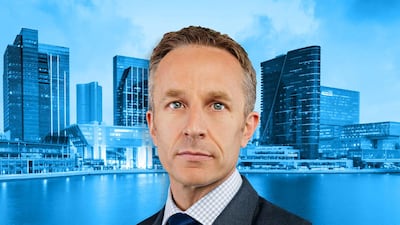Matthew Hurn describes the moment he found out he was being awarded the Order of the British Empire in the New Year’s Honours List as “very humbling”.
However, the chief financial officer of Mubadala’s Alternative Investments and Infrastructure business discovered he would receive the award for services to UK-UAE financial relations in mid-December – two weeks before the official announcement was made on December 30. This meant he was temporarily “burdened with this knowledge” and unable to discuss it.
“I didn't tell my wife almost till Christmas Eve,” he says.
Receiving the OBE in the Queen’s New Year Honours list was as “an incredibly proud moment for me and the family”, Mr Hurn says – not least because it recognises how far he has progressed since leaving school before he turned 16 to work at the local branch of the Trustee Savings Bank in Harlow, Essex.
He did not consider going to university, because “I was on the payroll” and already earning money. He instead gravitated towards the bank’s foreign exchange window and then into a career in treasury management– firstly in local government, and then the private sector.
He started at United Technologies, where he rose to manage its UK treasury operations. He then joined electronics retailer Dixons Stores Group (now Dixons Carphone), where he eventually became the youngest head of treasury for a FTSE100 company at the age of 30.
“I've worked with incredible people,” Mr Hurn says. “The CFO at the time was a gentleman called Ian Livingston, who is now Lord Livingston, and he went on to be the CEO of British Telecom. He was succeeded by Jeremy Darroch, who only announced last week [January 6] he's stepping down as the chairman of [media group] Sky.”
Along the way, he earned professional qualifications from the Association of Corporate Treasurers, whose exams taught him a lot about the significance of the role treasurers play in organisations.
"It’s around putting together the financial strategy to support the businesses commercial strategy, mindful of liquidity, funding, foreign exchange risks, commodity risks," Mr Hurn says.
Throughout the past 20 years, as various incidents – most notably the 2008 global financial crisis – have proved, "the role of treasury has become more prominent because cash is always king", he says.
Mr Hurn, 48, moved to the UAE 13 years ago. At the time, his children were young and he and his wife liked the idea of exposing them to different cultures.
Mr Hurn was familiar with the UAE, having spent his honeymoon in Dubai in 1998, and found a "strong affiliation with the leadership team" at Mubadala when he met them to present his ideas on setting up a treasury function and how it would support the organisation's objectives.
The main difference between accounting and treasury, he says, is the former is largely retrospective, but the latter is forward-looking and involves scenario planning to anticipate potential issues and ensure a business has the necessary resources to deal with them.
Mr Hurn's affiliation to the profession is clear – he helped set up a Middle East chapter of the ACT, which he has chaired for more than 10 years.
Professional associations such as the ACT are important, Mr Hurn says – particularly the role they play in training and in ongoing career development.
"If you want to ask for someone's opinion, great. If you want to rely on someone's opinion, make sure it's backed up with a certificate," he says.
More recently, he has been a board member of the UAE-UK Business Council for the past three years at a time when the organisation has been undergoing a reorganisation.
The council which was in need of a "refresh", is "a very important vehicle" for the respective nations to develop their respective economic agendas, Mr Hurn says.
Thankfully, this took place at the same time as both nations had published their trade agendas, which showed a significant overlap in certain areas – life sciences, pharmaceuticals, the future of mobility, renewables and green technology, and artificial intelligence.
The council has been reorganised in a way that these industries are represented on working groups and committees, but "not to the exclusion of other industries", Mr Hurn says.
The organisation’s co-chairs, UAE minister of state and Abu Dhabi Global Markets chairman Ahmed Al Sayegh and the former head of the UK’s Homes & Communities Agency, Lord Lister, have played an important role in driving change, he says.
"It comes at a time when the relationship between the two nations has probably never been stronger," Mr Hurn says.
"So many organisations in so many parts of the world would probably curtail you and not let you give back or demonstrate what you're capable of," but Mubadala’s chief executive, Khaldoon Al Mubarak and chief financial officer, Carlos Obeid, "gave me the opportunity" to take on extra-curricular roles.
"I can't think of a single idea that I presented to him [Mr Al Mubarak] – that hasn't been well thought through – and he said no. It's always ‘take it to the next level, see what you can do’. And they value the contribution. So I'm very mindful that this recognition [the OBE] goes to my friends, colleagues in the leadership here at Mubadala."
Mubadala is now undergoing a reorganisation of its own – around four new asset classes of UAE investments, disruptive investments, direct investments and real estate and infrastructure.
The changes will make sure that the organisation remains "agile, adaptive [and] responsive to future trends".
"I think in the 13 years we've had at Mubadala, we've had constant years of growth and development. I think we should look optimistically to the future, that with the right mandate, with the right opportunities, but also with the right mindset to manage and mitigate risk, we can achieve great things."


